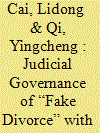| Srl | Item |
| 1 |
ID:
186062


|
|
|
|
|
| Summary/Abstract |
In 2016, China instituted an “Admission of Guilt and Acceptance of Punishment” (plea leniency) system to formalize the legal system’s approach to guilty pleas in criminal proceedings. To legitimize this new justice scheme, it decreed that every accused must be provided with access to legal representation to safeguard the voluntariness and accuracy of the plea. This article examines this mandatory defense counsel assistance and questions the extent to which Chinese lawyers comply with the legislative goal. Based on interviews with 34 lawyers who have served as defense attorneys in Shanghai, it is found that lawyers in plea leniency cases are essentially confined to three peripheral roles—“explainer,” “persuader,” and “observer.” Instead of conducting earnest work in plea negotiations and legal counseling, Chinese lawyers often “collegially” cooperate with criminal justice agencies (gongjianfa 公检法) to urge the accused to admit they are guilty. The findings indicate that the state’s paramount concern for efficiency inherently marginalizes counsel’s bargaining position. Pragmatic considerations also influence the defense counsel’s conduct: a desire to maintain a beneficial relationship with legal authorities and unwillingness to challenge the generally accusatory, draconian, and conviction-centered nature of Chinese criminal proceedings. Overall, plea leniency catalyzes a further emasculated role for lawyers, who function primarily as a mechanical constituent of the country’s increasingly monotonous assembly-line version of criminal justice.
|
|
|
|
|
|
|
|
|
|
|
|
|
|
|
|
| 2 |
ID:
165607


|
|
|
|
|
| Summary/Abstract |
“Fake divorce” is a phenomenon unique to China that re�ects the di�-
culty of harmonizing the social governance model under traditional
familism ( 家戶主義 jiahuzhuyi) with the trend toward individualization during Chinese society’s transition from a planned to a market
economy. �at di�culty and the absence of regulatory rules leave room
for the Chinese courts to innovatively interpret prevailing laws/regulations and create judicial rules by exercising their own discretion. By
analyzing the role the courts have played in adjudicating fake-divorcerelated disputes as well as the relationship between the judicial system
and overall political system, this article reveals their role in modernizing Chinese society during the transition period. It argues that
although judicial power remains embedded in the sociopolitical system,
the courts are to a certain extent so�ening the contradiction between
rigid policies and practical realities through the innovative exercise of
judicial rationality. In sum, the general approach adopted by the
Chinese courts in dealing with fake divorce disputes represents a
rational choice based on the exercise of limited judicial resources and
measures rather than a mechanical application of laws or rigid implementation of government policies and goals.
|
|
|
|
|
|
|
|
|
|
|
|
|
|
|
|